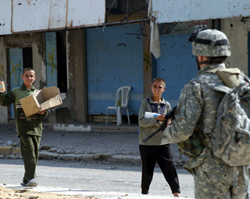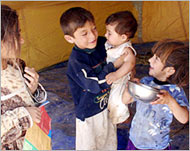Untitled Document
 |
Iraq's violence is depriving
children of a normal childhood |
Young boys run across a Baghdad garden firing plastic guns at each
other in a timeless game enjoyed around the world. But in Iraq, pretending to
kill each other is much more than child's play.
"Children believe this is a normal way of life," said Harith Hassan,
one of the country's leading psychologists. "They are developing psychopathic
personalities."
The costs of Iraq's war are often measured in terms of deaths and injuries.
But the conflict is also inflicting a heavy psychological toll on future generations
exposed to daily bombings and shootings.
Faced with the threat of violence every time they step outside, parents rarely
take their children to playgrounds.
Few safe places
Amusement halls and movie theatres have closed down and there are few safe
places to play sports.
 |
Displaced Iraqi children play inside a tent in Tal Afar |
Deprived of a normal childhood, an increasing number of youngsters are influenced
by guns and bombs, which are on their television screens every day and in their
neighbourhoods.
When Najim Mekki and his friends imitate battles between US forces and armed groups,
they need more than plastic assault rifles and machineguns for a thrill.
One of them dives to the ground and lights a firecracker, mimicking the blasts
that often echo over Baghdad, as another calls for help on a walkie-talkie.
"We always see the weapons of the Iraqi and American armies on television.
We try to imitate their battles in our homes but not in the street because there
are bombs in the streets," 13-year-old Mekki said.
"When the bombs started we were scared. But now we are used to it because
wherever you go you see blasts," he said.
Brief respite
Under Saddam Hussein's dictatorship, teachers spent much of their time glorifying
their leader and educating students about his Baath Party and war "victories"
over Iraq's enemies.
His overthrow was supposed to reform a rigid educational system and open up
children's minds.
But Iraqi children only had a few months of fragile peace after his fall before
the explosion of an insurgency that has killed thousands of security forces and
civilians.
Now teachers such as Lamia al-A'anee are struggling to divert students' attention
away from violence.
She spends a lot of time leading them through cheerful songs.
But when it's time for drawing class, boys and girls in her kindergarten sketch
images of tanks and fighter planes.
"Some of the children have seen shooting. Some have seen corpses in the
street. Some of their houses have been destroyed with their mothers in them,"
she said.
Too scared
Al-A'anee added: "I have children who play alone or hit themselves. Others
are too scared to make friends."
Many children have been victims of the bloodshed, which shows no sign of easing.
Toy store owner Ziad Daoud says booming sales of plastic tanks, planes and
guns, which replaced teddy bears, have started to decline due to rumours of
the risks.
"These days I am selling less because people started talking about American
soldiers mistakenly shooting children carrying plastic guns," he said.

